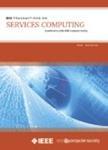版权所有:内蒙古大学图书馆 技术提供:维普资讯• 智图
内蒙古自治区呼和浩特市赛罕区大学西街235号 邮编: 010021

作者机构:Ucsc Department of Computer Science and Engineering Santa CruzCA95064 United States Academia Sinica Research Center for Information Technology Innovation Taipei City11529 Taiwan National Chung Cheng University Department of Computer Science and Information Engineering Chiayi62102 Taiwan Advanced Institute of Manufacturing with Hightech Innovations National Chung Cheng University Chiayi62102 Taiwan
出 版 物:《IEEE Transactions on Services Computing》 (IEEE Trans. Serv. Comput.)
年 卷 期:2023年第16卷第5期
页 面:3265-3279页
核心收录:
学科分类:0810[工学-信息与通信工程] 0808[工学-电气工程] 08[工学] 0701[理学-数学] 0812[工学-计算机科学与技术(可授工学、理学学位)]
基 金:National Science and Technology Council Academia Sinica under Thematic Research Advanced Institute of Manufacturing with High-tech Innovations Higher Education Sprout Project Ministry of Education (MOE) in Taiwan
摘 要:Federated learning (FL) emerges to mitigate the privacy concerns in machine learning-based services and applications, and personalized federated learning (PFL) evolves to alleviate the issue of data heterogeneity. However, FL and PFL usually rest on two assumptions: the users data is well-labeled, or the personalized goals align with sufficient local data. Unfortunately, the two assumptions may not hold in most cases, where data labeling is costly, or most users have no sufficient local data to satisfy their personalized needs. To this end, we first formulate the problem, DoLP, that studies the issue of insufficient and partially-labeled data on FL-based services. DoLP aims to maximize two service objectives: 1) personalized classification objective and 2) the personalized labeling objective for each user within the constraint of training time over wireless networks. Then, we propose a PFL-based service system DoFed-SPP to solve DoLP. The DoFed-SPP s novelty is two-fold. First, we devise an inference-based first-order approximation metric, similarity ratio, to identify the similarity between users local data. Second, we design an approximation algorithm to determine the appropriate size and set of users for uploading in each round. Extensive experiments show DoFed-SPP outperforms the state-of-the-art in final accuracy and time-to-accuracy performance on CIFAR10/100 and DBPedia. © 2008-2012 IEEE.